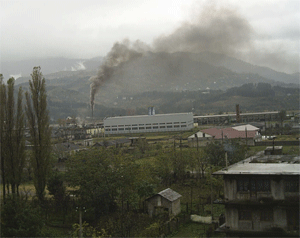Khelvachauri Inhabitants Want Fresh Air

The land close to the Chorokhi River in the Khelvachauri region is covered with smoke. The locals complain about breathing the exhaust fumes of five factories producing tarmac. Additionally, there is an acrid smell which is unbearable. The Environmental and Natural Resources Department in Adjara has not got any equipment to estimate the level of pollution or if there is a real danger to health.
“We live in a constant fog. There is a horrible smell and smoke. We, old people, are accustomed to this environment, but the health of our offspring is at great risk. We do not let the children play outside. We cannot dry our laundry during the day”, says Nanuli Mamuladze, a local inhabitant. The block of flats where she lives with 6 other families is the nearest to the factory.
Because of the fumes, 180 children at the kindergarten cannot play outside. “We cannot let the children play outside the building, even in the summer. They would do better to stay inside than breathe polluted air”, says Lela Gurgenidze, the kindergarten teacher.
The Environmental Protection Department visited the factory on 5th July 2005. As a result, only one factory was fined 60 laris; the others were just given a warning. The local inhabitants addressed the regional administration. However, nothing has been done. “They never fulfill their promises that everything will be changed and the situation improved. They do business while we suffer from various diseases”, says Nona Zakaradze.
The Head of the Department for Environmental and Natural Resources, Gia Koridze, thinks that the main reason for the pollution is the bad oil that is used by the factories. He says: “Each factory has a filter, though it is not suitable for the oil that is used by the factories. It seems that the management of the factories is trying save some money by purchasing bad oil”.
It should be mentioned that Koridze considers the filters to be the only reason for the pollution, although he forgets the poor state of the out-dated equipment in the factories. This fact is confirmed by some of the employees from the factories. The 7th traffic department has existed for 15 years now. Although, the factory operates with German equipment, factory worker Valeri Tsivtsivadze speaks about the poor condition of the equipment. “We used to produce 80 tones of tarmac but now we make less because the equipment has become out of date”.
Shota Dondoladze, the Deputy Director of “Gzebi” (Ways) LTD, states that the factory employees are mostly the local inhabitants, however, they never complain about the pollution of the environment. “We do our best not to pollute the environment”, he stated.
No one has any answers to the question of whether the environment surrounding the factories is polluted. It is also unknown if it is dangerous for the population to live there. “We do not have the equipment to find out the proportion of the chemicals in the air and estimate their effects upon humans”, said the Deputy Head of the Environmental and Natural Resources Department to the Human Rights Information and Documentation Centre.
Maka Malakmadze from Batumi



